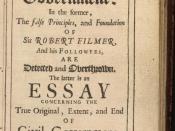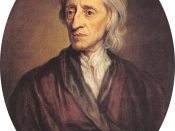Thomas Hobbes (1588-1679) and John Locke (1632-1704) should be thought of as two of the greatest political philosophers England ever produced. Each of them was intimately concerned with issues relating to human knowledge and the ways in which human beings learn and reach certain levels of understanding. It should also be noted that the two shared a number of connections that led toward something of a synthesis of thought in many aspects of their thinking and concerns. For example, historians have noted that Hobbe's Leviathan clearly had an enormous influence on Locke's thinking since he adopted many of its views as his own - the essential rationality of man, the theories of natural right, natural law, the state of nature, and the social contract. In Leviathan, Thomas Hobbes presents man as a machine operating on the basis of cause-and-effect or stimulus-response. Man seeks to achieve a single goal-the satisfaction of human appetite.
Appetite arises out of sensation as the external world presses upon human sense organs. The sights, smells, touches, and sounds of pleasurable things gives rise to appetite. Appetite gives rise to will; will precedes action.
Fundamentals of Locke
In his Second Treatise on Civil Government (1689), which is considered his greatest contribution in the realm of political theory, John Locke specifically centers his view on a rather narrowly defined aspect of politics, the part, he explains, that is most concerned with "the True Original, Extent, and End of Civil Government." While his major focus is the framework of justifiable and workable government, Locke also establishes the issues and viability relating to virtue. Locke believes that the only reason society degenerates to armed conflict and strife is because of a depletion of the essential ingredients of an individual or a community's self-preservation.
Those ingredients, include: the right...


